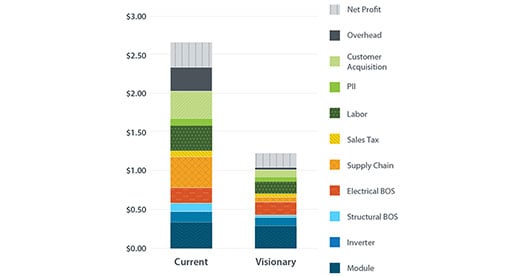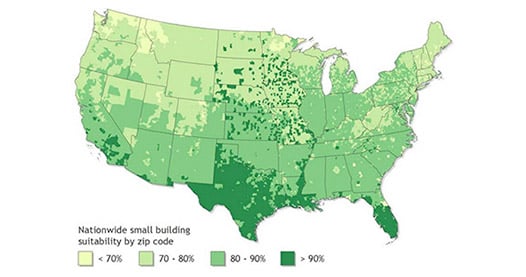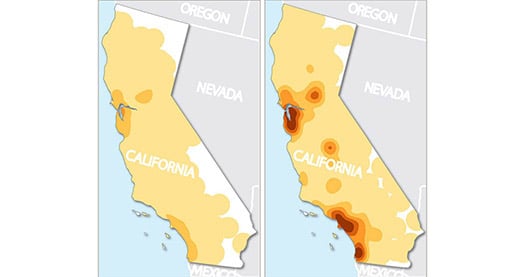Market Acceleration Studies
For industrywide market acceleration, the Solar Energy Evolution and Diffusion Studies (SEEDS) use data-driven and evidence-based methods to identify characteristics, motivations, and barriers to photovoltaic (PV) adoption.
The U.S. Department of Energy leads the SEEDS funding program and awards projects that investigate strategies to accelerate the cost competitiveness of solar energy. NREL has been awarded funding in each of the three rounds of SEEDS.
Workshop on Shaping the Future of Solar on New Home Construction
The workshop on Feb. 3, 2025, has been postponed.
Publications
Over the course of the SEEDS program, NREL researchers and their collaborators have published research on many topics related to solar adoption.
More Alike Than Different: Profiles of High-income and Low-income Rooftop Solar Adopters in the United States, Energy Research & Social Science (2020)
This study surveyed over 500 low-to-moderate-income adopter households in California who received their solar photovoltaics (PV) systems for free through a nonprofit. Their responses were compared to those in an existing data set of high-income PV adopters in the same state.
Distributional Disparities in Residential Rooftop Solar Potential and Penetration in Four Cities in the United States, Energy Research & Social Science (2020)
This study compared rooftop solar potential, the distribution of rooftop solar systems, and census tract-level socioeconomic and demographic characteristics across four U.S. cities to understand neighborhood-level factors that explain disparities in solar adoption.
Using Willingness To Pay To Forecast the Adoption of Solar Photovoltaics: A “Parameterization + Calibration” Approach, Energy Policy (2020)
This study used a “parameterization + calibration” approach to address biases and estimate customer willingness for rooftop solar. Results are benchmarked against historic adoption rates in key U.S. markets and across solar business models. The end result is a data-driven assessment of the relationship between solar economics and adoption rates.
Rooftop Solar Technical Potential for Low-to-Moderate Income Households in the United States, NREL Technical Report (2018)
Relying on LiDAR scans, census data, and complex statistical analysis, this study provides a novel assessment of the solar generation potential in low-to-moderate income households in the United States, demonstrating that low-to-moderate-income rooftop solar could contribute up to 42% of all rooftop technical potential in the residential sector. Explore the report's data on an interactive map. Access the full data set.
Accelerating Demand for Residential Solar Photovoltaics: Can Simple Framing Strategies Increase Consumer Interest?, Global Environmental Change (2018)
Through a series of randomized experiments, this study examines whether framing strategies grounded in behavioral economics and psychology can be used to increase the financial appeal of household energy-efficient and renewable energy technologies.
Agent‐Based Explorations of Environmental Consumption in Segregated Networks, Social Systems Engineering: The Design of Complexity (2017)
This chapter, part of a book on social systems engineering, presents a theoretical, agent‐based model of how individuals in a social system make choices about adopting a high‐cost, environmentally friendly technology such as solar PV. The authors present the agent-based model in detail and discuss its implications.
Explaining Interest in Adopting Residential Solar Photovoltaic Systems in the United States: Toward an Integration of Behavioral Theories, Energy Research & Social Science (2017)
This study proposes a theoretical framework for investigating the psychological and social determinants of interest in residential solar. It draws from three theories that may explain the decision to pursue solar: diffusion of innovations theory, theory of planned behavior, and value-belief-norm theory. The framework is tested using survey data from 904 nonadopter homeowners, with the aim of identifying potential levers for intervention.
A Non-Modeling Exploration of Residential Solar Photovoltaic (PV) Adoption and Non-Adoption, NREL Technical Report (2017)
This study helps to inform a more detailed understanding of residential PV adoption, consideration, and nonadoption as well as attitudes and experiences with PV overall. The study draws on a diverse set of survey data—collected from nearly 3,600 single-family, owner-occupied households across four states—to examine residential PV adoption and nonadoption, the varieties of adopters and nonadopters, and the roles of policies and marketing in shaping these segments. Access the full data set.
The Price-Concentration Relationship in Early Residential Solar Third-Party Markets,, NREL Technical Report (2017)
It is often assumed that more competition leads to lower prices in residential PV markets, but this is not universally true. This study focuses on identifying the causal relationship between market structure and the prices paid by consumers. Using a unique data set of third-party-owned contract terms for the residential solar PV market in the San Diego Gas & Electricity service territory, this study finds that firms charged higher prices in more competitive markets in the sample.
Using Machine Learning and Data Analysis To Improve Customer Acquisition and Marketing in Residential Solar, NREL Fact Sheet (2017)
This fact sheet offers a broad overview of the work SEEDS researchers have undertaken to improve our understanding of solar adoption and to reduce the costs of customer acquisition and marketing.
Understanding the Evolution of Customer Motivations and Adoption Barriers in Residential Solar Markets: Survey Data, NREL Data Set (2017)
This open-source dataset contains anonymized survey responses for three key populations: households that have adopted solar, those that considered but ultimately did not adopt, and a representative panel of homeowners. These data can be used to understand household level motivations for adopting solar as well as derive descriptive statistics on solar motivations and barriers.
Agent-Based Modelling of Consumer Energy Choices, Nature Climate Change (2016)
This study provides an overview of agent-based modeling (ABM) work in the area of consumer energy choices, with a focus on identifying specific ways in which ABM can improve understanding of the demand side of energy to aid the design of better policies and programs. The study also touches on future research needs for improving the practice of ABM to better understand energy demand.
The Distributed Generation Market Demand Model (dGen): Documentation, NREL Technical Report (2016)
The dGen™ model is a geospatially rich, bottom-up, market-penetration model that simulates the potential adoption of distributed energy resources for residential, commercial, and industrial entities in the continental United States through 2050. NREL developed dGen to analyze the key factors that will affect future market demand for distributed solar, wind, storage, and other distributed energy resource technologies in the United States within a single modeling platform. Visit the dGen website.
Share
Last Updated April 3, 2025



